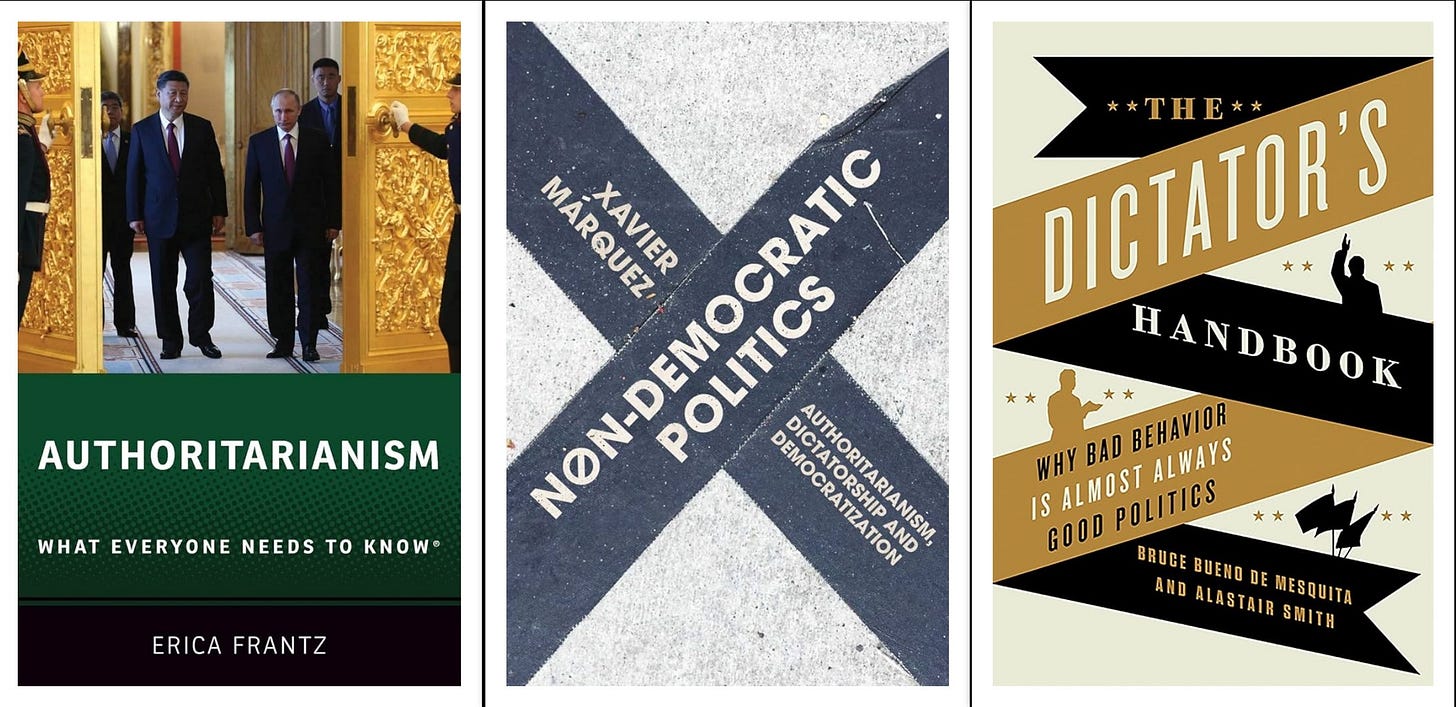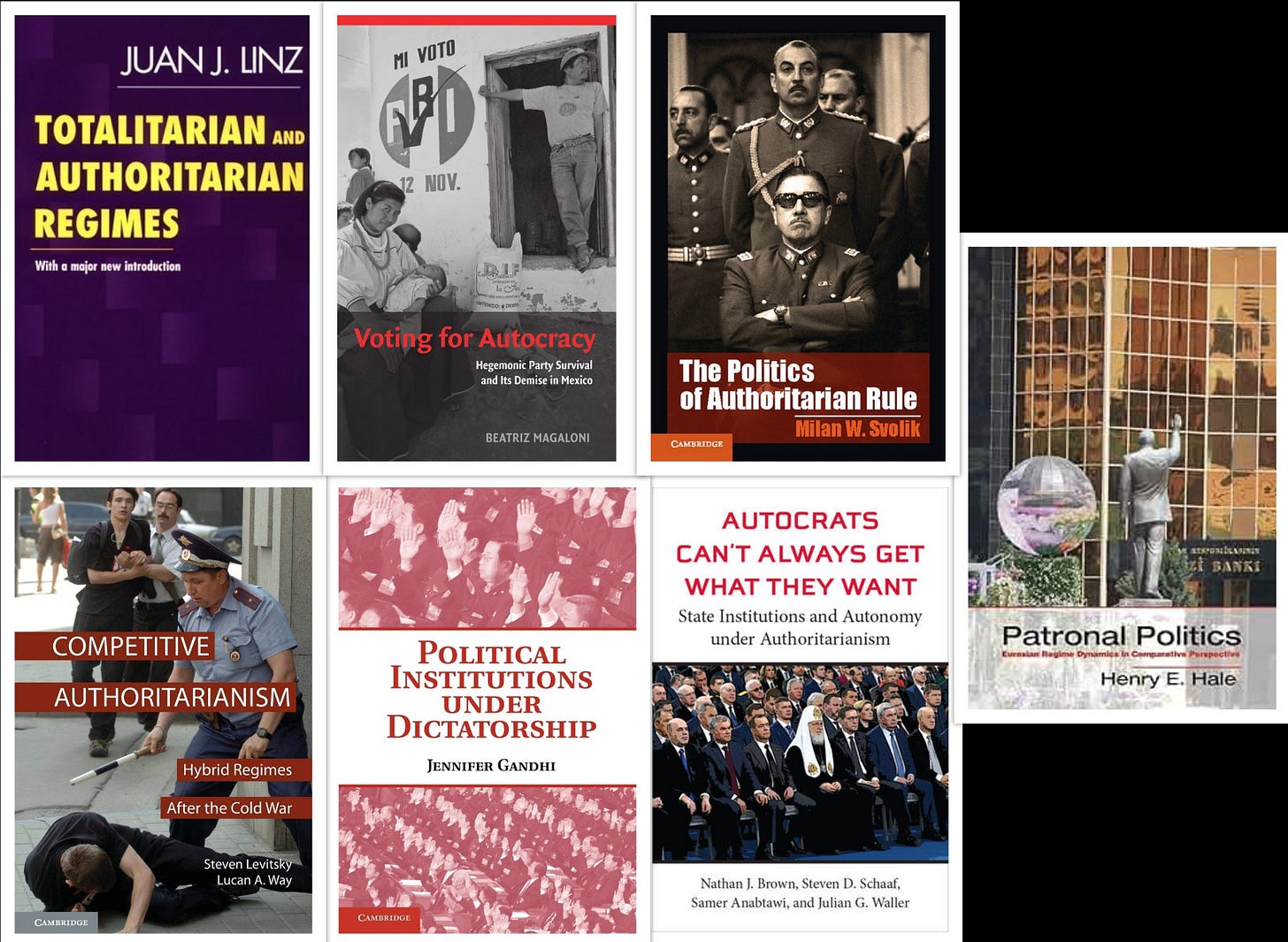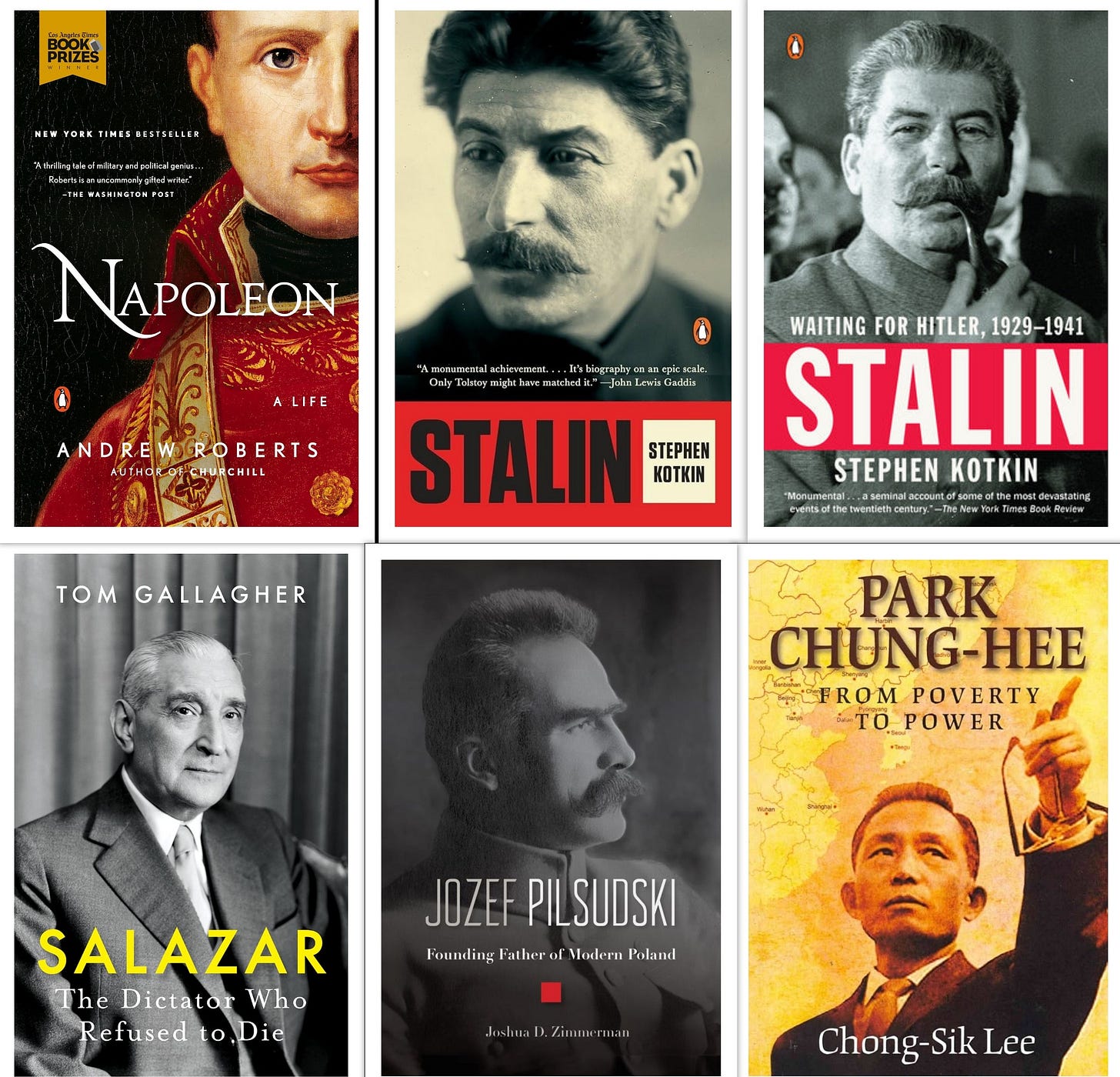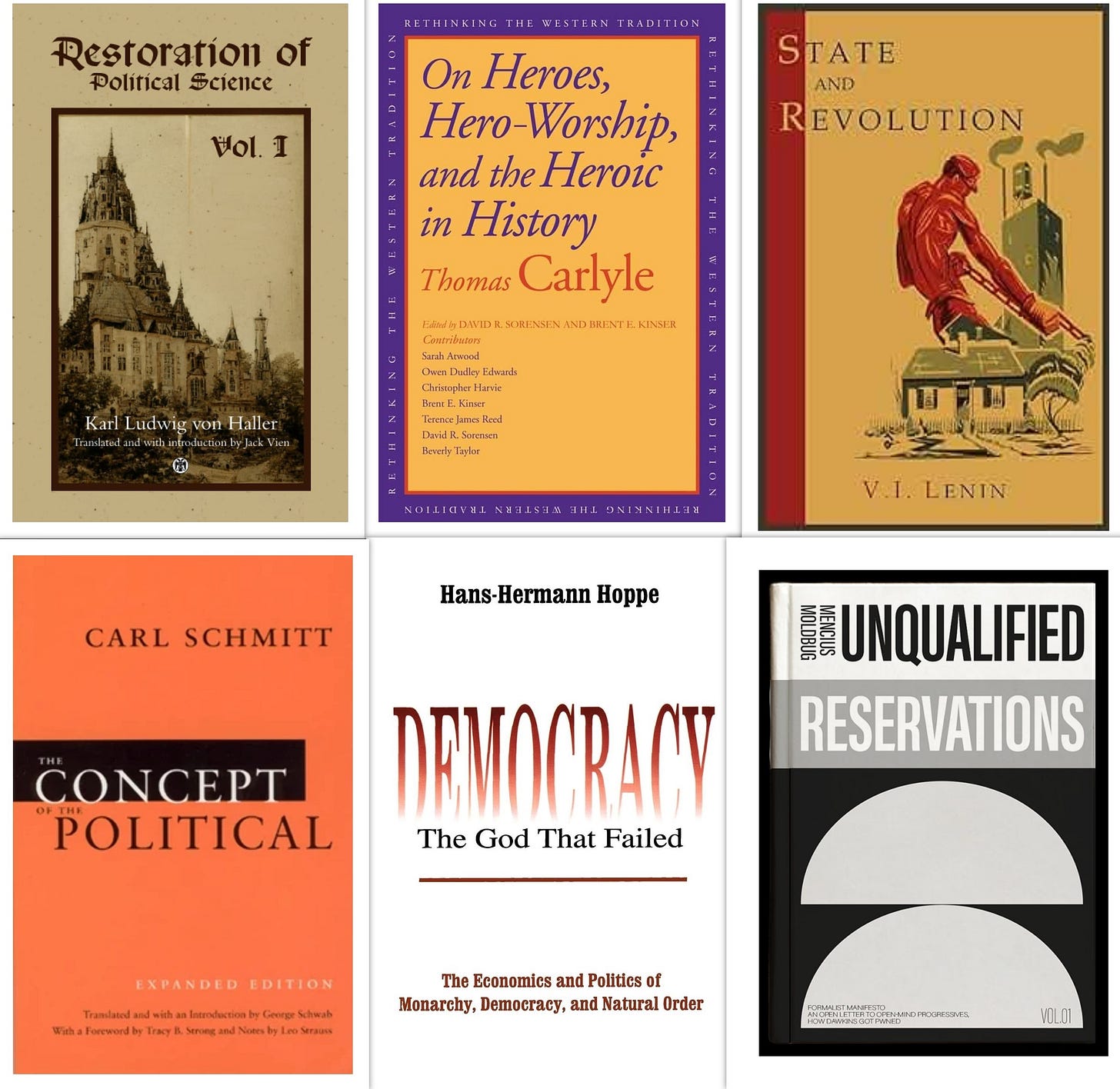An Authoritarian Reading List
For authoritarians and those who study it, just in time for Christmas
Précis/TL;DR: in which we introduce a set of short reading lists for those interested in the study of authoritarian regimes. These lists are broken into three categories: one for the interested outsider, one for the undergraduate, and one for the graduate. Two supplementary lists are also included for those interested in diving deeper on the authoritarian side of things. Publication announcements conclude. Merry Christmas 2024!
Making a List and Checking It Twice
One of my verbal tics as a professor is to follow some convoluted point about Russian party politics or foreign policy decision-making or military performance or what-have-you with a variation on the following line: “and this little tid-bit is perfect to drop when you’re trying to impress someone at a party here in Washington…” Sometimes the students laugh, other times they roll their eyes and I move on.
Funnily enough, I actually experienced something like this exact scenario a while ago at a party here in Washington, DC. In this case, I was asked what I would recommend as a book to read if that person wanted a good ‘take’ on authoritarianism. I’ve been thinking about this ever since (prompted by another person asking the same question, although regrettably not in a festive environment). So I thought I’d block out a preliminary list for the interested reader. Indeed, a perfect resource for the approaching Christmas season! 🎄
I’ve been going back and forth on this question for a little while now, however, as there really isn’t one single short list of books to recommend. There’s at least three distinct reading lists to suggest, if not more. The reason is simple. Depending on one’s position in life and level of interest, it might be completely inappropriate to suggest one book over another. Yet from another vantage point it might in fact be impossible not to. It really depends on what you’re looking for and what you’re trying to learn.
If I were to recommend a major academic text on one aspect of authoritarian politics, that option might just blow past someone who is really looking for a basic, holistic account… or alternatively the person might be looking for something much more comprehensive. Similarly, for someone who is looking to be a scholar or researcher in the field someday (or to be professionally conversant in its debates), something broad-brush will be completely insufficient.
So here are a few lists. They could be combined together (for the Ph.D type, that is likely the best choice) or mixed and matched (the outsider to the discipline may find some use there). I’ve broken it into three types of people who might ask the question: the interested outsider, the undergraduate, and the graduate student. A fourth includes biographies, which are often the most fun place to start - and provide rich context. A fifth, spicier list follows for purposes of being comprehensive.
If you have alternatives that really should be included, comment below or shoot me an email! I’ll inevitably revise this list for next year’s Christmas season…
List #1, For The Interested Outsider
This first list is meant for someone who is interested in authoritarianism, authoritarian politics, dictatorships, and so on, but is likely to only read a few books on the subject.
That is, someone who is intelligent and thoughtful, but not interested in something niche or technical. Someone who might read Robert Putnam’s famous monograph on modern social isolation Bowling Alone, but would never think to touch a textbook on the concept of ‘social capital.’ Someone who doesn’t want an explainer, but a rich account with a major theoretical statement about how the world works - and ideally interesting to read from a non-technical standpoint.
For these reasons, this hypothetical person is probably interested not just in the study of authoritarianism itself (lists and typologies!) but where it comes from, why it develops, how it falls or survives, etc. Something that makes a claim about major processes in the world. There are a few classic and more contemporary works that I think fit the bill perfectly.
Political Order in Changing Societies, Samuel P. Huntington
Totalitarian Dictatorship and Autocracy, Carl Friedrich & Zbigniew Brzezinski
The Social Origins of Dictatorship and Democracy, Barrington Moore, Jr.
Polyarchy, Robert Dahl
Political Order and Political Decay, Francis Fukuyama
These are all big-think books that are classics in the field (and one modern update). Huntington’s Political Order is the inspiration for our newsletter’s name, and the most important political science statement on developing states and authoritarianism during the Cold War. Friedrich and Brzezinski, meanwhile, gave us the classic statement on totalitarianism and set the stage for us to compare Nazi Germany with Stalin’s USSR (you can also read Hannah Arendt for a distinct take from the same time period).
Barrington Moore’s Social Origins is a grand monograph on why the UK and France became democracies while Germany and Japan did not over the 19th and 20th centuries. An incredibly interesting set of narrative cases from a class-materialist perspective where you’ll find plenty to agree and disagree with. Dahl’s Polyarchy is really on the difference between ideal and ‘actually-existing’ democracy (as of the 1970s) but is foundational to the regimes conversation. And Fukuyama’s own Political Order is an attempt to update Huntington with the collected work of hundreds of social scientists since his era, written for a public audience. It also bridges the gap between the old way of social-scientific thought on regimes and the contemporary.
List #2, For the Undergraduate
This list is a little different, seeking to provide textbook-like coverage that overviews what we mean when we talk about authoritarianism, why different labels and terms matter, and how we think they work in an introductory scholarly sense. These are much more straightforward than the first list, but also more schematic.
Authoritarianism: What Everyone Needs to Know, Erica Frantz
Non-Democratic Politics, Xavier Marquez
The Dictator’s Handbook, Alastair Smith & Bruce Bueno de Mesquita
There are a variety of textbook-like options (which in this case means organized systematically and trying to capture the field’s general contours as an introduction), but these are the best that I’m tracking right now.
Frantz’s book is short, concise, and thorough and provides a good primer on the dominant strain of the ‘plural regimes’ framework that is most commonly used in social science today. Marquez’ Non-Democratic Politics is a little longer, and brings in totalitarianism and ideas more to the front. He’s told me he’ll update it one day, but for now it really is a great comprehensive resource. And the Handbook is a great intro for the ‘how to build an authoritarian regime’ genre, of which there are now many options.
List #3, For the Graduate
This list brings us more into the authoritarian weeds, making specific theoretical claims about authoritarian institutions, regime-types, mechanisms of rule and accountability, and so on. These give you detailed insights into various working parts of authoritarianism, and often have statistical components.
I’ve stuck to just a small selection biggest names in recent decades which will be absolutely necessary for any graduate student digging into the study of comparative authoritarianism. This list is already too long, but assume there are many more that could be included profitably and justifiably.
Totalitarianism and Authoritarian Regimes, Juan J. Linz
The Politics of Authoritarian Rule, Milan Svolik
Voting for Autocracy, Beatriz Magaloni
Competitive Authoritarianism, Steven Levitsky & Lucan A. Way
Political Institutions Under Dictatorships, Jennifer Gandhi
Patronal Politics, Henry E. Hale
Autocrats Can’t Always Get What They Want, Nathan J. Brown, Steven D. Schaaf, Samer Anabtawi, & Julian G. Waller
Linz is the major update to Friedrich & Brzezinski, in my mind, and he is also the great popularizer of the ‘authoritarianism’ label. Svolik wrote the modern classic on elite constraint (or lack thereof) in authoritarian regimes, as a constant struggle between the autocrat and supportive loyalists. Magaloni’s Voting for Autocracy is a story of Mexico under the PRI regime, but really set the stage for all subsequent work on authoritarian elections. Competitive Authoritarianism is the tremendously influential conceptualization of post-Cold War electoral authoritarianism, or what we used to call ‘hybrid regimes’ - absolutely a must-read in the discipline.
Gandhi’s Political Institutions is similarly foundational for centering institutions in contemporary studies of non-democracy. Hale’s Patronal Politics combines elections and constitutions with the widespread informality found in authoritarian regimes to explain post-Soviet politics better than anyone else. Henry was also my dissertation advisor, so that’s an extra plus. And finally Autocrats Can’t Get What They Want, our beautiful, magisterial, and path-breaking study on institutional autonomy in authoritarian regimes is destined to be a core cite for all future research - obviously.
List #4, For the History Lover
For those that want a read that dives you into the inner life of authoritarian rule at the most personal level, here is a small collection of biographies. There are so many excellent -and very different - ones to choose from, here is just a very short list to start one’s reading.
Napoleon: A Life, Andrew Roberts
Stalin: Paradoxes of Power & Stalin: Waiting for Hitler, Stephen Kotkin
Salazar: The Dictator Who Refused to Die, Tom Gallagher
Jozef Pilsudski: Founding Father of Modern Poland, Joshua Zimmerman
Park Chung-Hee: From Poverty to Power, Chong Sik-Lee
The figures here are chosen for their transformational role in national or world history (Napoleon, Stalin, and Park, respectively), their modeling of long-term stable authoritarianism (Salazar), or their expansion of how we think about big-tent, coalitional authoritarianism develops under trying local circumstances (Piłsudski).
This list could have also been a set of broad accounts of the past (say communism or fascism or what have you), but I think the biographical approach is more enjoyable, especially for the dabbling reader.
List #5, For the Authoritarian Him or Herself
Finally, for those that want to dive into the wild world of ‘authoritarian theorists’ - from their own perspectives - here is a smattering of interesting writing that you might take a look at. This is just a short sample, and frankly most authoritarian theorists write articles and essays rather than whole books. Still, these are a few good launching points to study democracy’s hardcore detractors.
The Restoration of Political Science, Karl Ludwig von Haller
On Heroes, Hero-Worship, & the Heroic in History, Thomas Carlyle
The Concept of the Political, Carl Schmitt
State and Revolution, Vladimir Lenin
Democracy, The God That Failed, Hans Hermann-Hoppe
Unqualified Reservations: Volume I, Curtis Yarvin
This is an eclectic list, as befits a collection of authoritarian theorists. Von Haller and Carlyle are writing in the 19th century, defending the idea of paternalistic rule and the ‘Great Man of History,’ respectively. Schmitt and Lenin are classic statements from the fin-de-siècle and Interwar eras on alternatives to ‘bourgeois’ or ‘liberal’ governance and decision-making, and had tremendous real-world impact in the USSR and Germany. You can also find very interesting things in Schmitt’s Dictatorship as well, but Concept should come first.
Among contemporary authoritarian theorists, there are few full monographs. Hermann-Hoppe is the major exception, writing a hard libertarian defense of monarchy (or “monarchy” as a semi-anarchist economist might conceive it). Meanwhile, the most famous authoritarian theorist of the 2000s onward is actually a blogger and essayist. Yarvin’s first collection of writing has now recently appeared in print, so if you don’t want to find his work online across a disparate set of links, you can start there. He has popularized the idea of the “CEO-Monarch” in Silicon Valley, so you can see the through-line from von Haller and Carlyle onward here. These are far from the only options one could choose, it’s a start - and you can always ask me for more…
Further Reading:
The list of new reading is very short since our last newsletter. I really only have one thing to add. Namely, check out the second in my series on the upcoming “Dictators in Europe & Russia” course I’ll be teaching next year if you haven’t already:
I was hoping to have something else to share, but sadly it is still with the editor. So that’ll just have to wait until our next newsletter.
An Outside Reading Corner
I’m introducing a new section to this newsletter. Here I’ll highlight books I’m reading or excited about, and therefore recommend. Just one entry today, also in honor of the Christmas gift-buying season: Astronomy: A Beginner's Guide, by my father William Waller. A topic far afield from our normal themes, but recommended for all those interested in the stars and our cosmos. The blurb runs as such:
To study astronomy is to consider the most wondrous phenomena on the grandest of scales – the universe and all it contains. Beginning with our earliest explorations of the night sky, William Waller takes us on an enthralling journey through the Milky Way and far, far beyond. He combines science and history to show how our understanding of everything from black holes to the structure of the universe has evolved over time, illuminating past discoveries and offering contemporary insights into the cosmic histories of stars, planets and galaxies. Whether object of study or curiosity, the universe – and all it contains – is tantalizingly introduced here.
This is a great, and cheap, stocking-stuffer book. And as it is from Dr. Waller the Elder, you know the quality is high and the prose engagingly rich. You can find it here on Amazon. You can also find his in-depth guide to the Milky Way galaxy here as The Milky Way: An Insider's Guide.
That’s all from me for now, and probably until the New Year. Have a very merry Christmas and a great start to 2025!
-Julian










What do you think of Timothy Snyder’s book, On Tyranny? Guess I was surprised you didn’t include the professor’s concise work at least in your list of books for undergraduates. Just wondering… 🤔
A remarkably well-curated list—useful not just for understanding authoritarian regimes, but for grasping the intellectual scaffolding that props them up